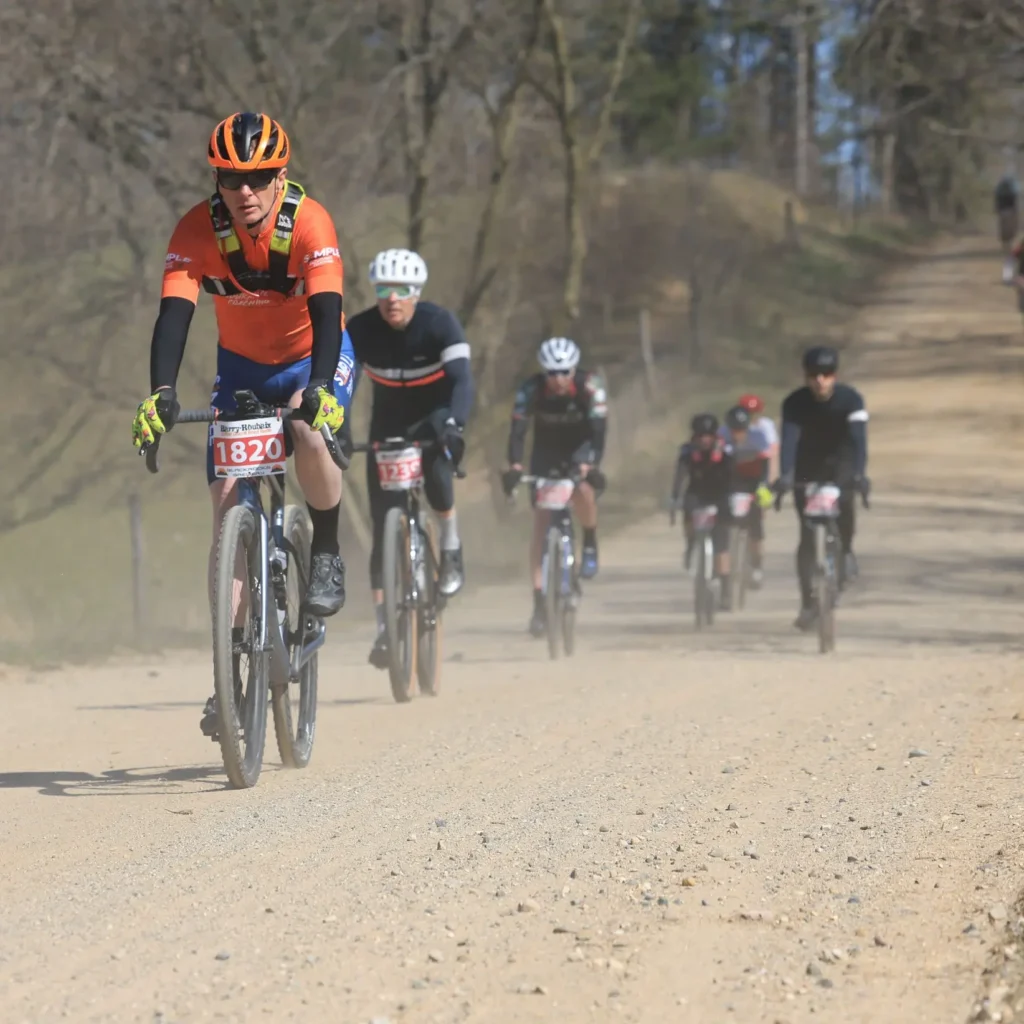The Best Way to Fuel Early Morning Workouts: Quick Pre- and Post-Workout Nutrition for Endurance Athletes
I typically dislike early morning workouts – a lot!
But I’ll be teaching some crack of dawn cycling classes starting in December, so I need to know what to eat before and after the workouts.
Fueling effectively before and after these sessions is crucial when you’re preparing for gravel racing, trail running, or next year’s cyclocross season.
For many, a quick meal or snack before heading out the door or onto the bike trainer can provide the needed energy for endurance activities like running or cycling.
However, when you’re working out right after waking up, finding the right balance of nutrients becomes even more important.
We’ll explore some of the best options for fueling pre- and post-workout, including strategies for those on a low-carb, high-fat diet.

Why Fueling Matters for Early Morning Workouts
Exercising after a night of fasting means your body has depleted glycogen stores, making it harder to perform well without some kind of fuel.
Eating a small, balanced snack before your workout can help maintain energy levels, improve performance, and keep you from feeling sluggish or dizzy.
For endurance athletes especially, proper fueling supports energy, focus, and recovery, setting you up for better workout quality and overall results.
Pre-Workout Fuel: Quick Options to Get You Started
Since you don’t have much time to digest a large meal, pre-workout fuel should be easy to prepare, easy to digest, and provide a quick energy boost.
Here are some options for both traditional and low-carb, high-fat (LCHF) approaches:
For Carbohydrate-Based Athletes
- Banana with Nut Butter: A banana offers quick carbs while a small spoonful of almond or peanut butter adds a touch of fat to slow down absorption and keep you full.
- Greek Yogurt with Honey: Greek yogurt provides a mix of protein and a small amount of fat, while a drizzle of honey delivers fast-acting carbs. This combination can be ideal for workouts around 45-60 minutes.
- Rice Cake with Almond Butter and Sliced Berries: Rice cakes are light and easy to digest, while almond butter and berries add a balanced boost of carbs and fats without weighing you down.
- Overnight Oats: Prepared the night before with oats, a splash of milk, and some berries or honey, overnight oats are a solid choice for those who want more sustained energy over a long morning session.
For Low-Carb, High-Fat (LCHF) Athletes
- Half an Avocado with Sea Salt: Avocado offers healthy fats and a bit of fiber. Adding sea salt helps with electrolyte balance, especially for early morning workouts where hydration is essential.
- Coffee with Coconut Oil or MCT Oil: Known as “bulletproof coffee,” this can be a good option for those who are fat-adapted. The MCT oil provides quick energy without raising blood sugar, making it a favorite among those following a low-carb diet.
- Boiled Egg and a Handful of Nuts: Eggs provide protein and fat, while nuts like almonds or walnuts give extra healthy fats. This combination is light but keeps energy levels stable for shorter sessions.
- Cottage Cheese with Flax Seeds: Cottage cheese is high in protein and fat, while flax seeds add fiber and omega-3s, which can be beneficial for low-carb endurance athletes.
Benefits of Coffee Before Early Morning Workouts
- Boosts Energy and Focus: Coffee contains caffeine, a natural stimulant that can help increase alertness and reduce the groggy feeling common in early morning workouts. This can make it easier to get moving and stay focused on your training.
- Enhances Performance: Research shows that caffeine can improve endurance performance by helping the body tap into fat stores for energy, which can be beneficial for both carb-based and low-carb athletes. It may also reduce perceived exertion, making your workout feel easier.
- Supports Fat Utilization: For those on a low-carb, high-fat (LCHF) diet, coffee with added fat (like coconut oil, butter, or MCT oil) can provide an additional energy boost without spiking blood sugar, helping the body continue to burn fat for fuel.
How to Use Coffee as a Pre-Workout Fuel
If you enjoy coffee before workouts, here are a few ways to incorporate it:
- Black Coffee or Espresso: Simple and effective, a small cup of black coffee or a shot of espresso can give you a clean boost of caffeine without adding extra calories. Drink it about 30 minutes before starting to give the caffeine time to kick in.
- Bulletproof Coffee: If you’re following a low-carb or ketogenic diet, you might add a spoonful of MCT oil or coconut oil to your coffee. Known as “bulletproof coffee,” this mixture provides additional fat to support sustained energy and helps avoid any sugar crash.
- Coffee with a Small Snack: If you prefer a mix of carbs and caffeine, pair your coffee with a light pre-workout snack like half a banana or a rice cake with nut butter. This combo can give you both immediate energy from the carbs and sustained energy from the caffeine.
Considerations When Using Coffee as Pre-Workout Fuel
- Start Small: If you’re new to drinking coffee before workouts, start with a small amount to see how your body reacts, as too much caffeine can cause jitters or upset stomach for some people.
- Avoid Adding Sugar: Sugary coffees can lead to a quick energy spike followed by a crash. Stick to black coffee or low-calorie additions if possible, and save any post-workout sweetness for a recovery smoothie or snack.
- Hydration: Caffeine is a mild diuretic, so balance coffee with water to ensure you’re adequately hydrated before you start your workout. A good rule is to have a glass of water with your coffee or pre-workout snack.
Post-Workout Fuel: Recovery and Refuel
After your workout, it’s essential to replenish energy stores, repair muscle tissue, and prepare your body for the rest of the day. Here’s what to consider for post-workout fueling based on dietary preferences.
For Carbohydrate-Based Athletes
- Smoothie with Banana, Spinach, and Protein Powder: Smoothies are quick to make and easy to digest. Include a banana for carbs, spinach for nutrients, and protein powder to aid muscle repair.
- Toast with Eggs and Avocado: A slice of whole-grain toast topped with a poached or scrambled egg and avocado provides carbs, protein, and healthy fats – a perfect balance for recovery.
- Quinoa Bowl with Veggies and Grilled Chicken: Quinoa is a complete protein and offers complex carbs, while veggies add antioxidants, and chicken provides lean protein for muscle recovery.
- Oatmeal with Almond Butter and Berries: A hearty oatmeal bowl replenishes glycogen stores, while almond butter and berries add fiber, antioxidants, and healthy fats.
For Low-Carb, High-Fat (LCHF) Athletes
- Salmon and Avocado Salad: Salmon provides high-quality protein and omega-3s, while avocado adds healthy fats. This combination supports muscle recovery without heavy carbs.
- Greek Yogurt with Chia Seeds and Berries: Greek yogurt offers protein, while chia seeds provide fiber and omega-3s. Berries add a touch of natural sweetness and antioxidants without too many carbs.
- Veggie Omelet with Cheese: Eggs are a great source of protein, and adding cheese offers extra fat to support energy needs. Vegetables like spinach, peppers, and tomatoes add flavor and micronutrients.
- Nuts, Seeds, and Cottage Cheese: A simple, low-carb post-workout snack that includes high-quality protein, healthy fats, and fiber.
Additional Tips for Morning Workout Fueling
- Hydrate First: Always start with water. Even slight dehydration can impact performance. If you’re low on time, consider adding an electrolyte tablet to boost hydration faster.
- Choose Easily Digestible Options: Foods that are too rich or heavy can lead to discomfort, especially right before a workout. Focus on smaller portions and easily digestible ingredients.
- Avoid Too Much Fiber Before Workout: While fiber is essential for overall health, too much right before exercise can cause digestive issues, so be mindful of your pre-workout choices.
Take the Time to Find the Right Fuel
Finding the right fuel for early morning workouts is a game-changer for endurance athletes, especially when balancing the need for quick energy with minimal preparation time.
Whether you’re following a traditional carb-based diet or a low-carb, high-fat approach, there are plenty of options to keep you energized for your session and aid in effective recovery afterward.
Experiment with the pre- and post-workout snacks that best support your body and performance, and remember that hydration is just as important as food intake.
With the right fuel, you’ll be ready to tackle any morning ride or run, making the most of every early workout session.
Three Things to Know About Fueling for Early Morning Workouts
- Prioritize quick, easily digestible fuel pre-workout with a small, balanced snack to boost energy levels.
- Refuel post-workout for recovery by focusing on replenishing energy and aiding muscle recovery with balanced meals that include protein, fats, and, for carb-based athletes, carbs.
- Drinking coffee 30 minutes before a workout can boost focus and energy, especially in the morning.
Need more?
Unlock the secrets to mastering gravel racing with my FREE 24-page Guide to Gravel Racing! Get yours here.
SIGN UP FOR A FREE Virtual Coffee so we can discuss your goals, ask questions, and talk about making your endurance training more effective, fun, and Simple.
Paul Warloski is a:
- USA Cycling Level 3 Advanced Certified Coach
- RRCA Running Coach
- Training Peaks Level 2 Coach
- RYT-200 Yoga Instructor
- Certified Personal Trainer




